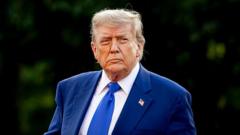What’s Behind Trump’s Invitation to Five African Leaders at the White House?

Understanding the Significance of Trump's Upcoming Meeting with African Leaders
The forthcoming summit featuring U.S. President Donald Trump and leaders from five African nations—Gabon, Guinea-Bissau, Liberia, Mauritania, and Senegal—promises to be a pivotal moment in U.S.-Africa relations. Framed as an opportunity to bolster trade rather than rely on aid, this three-day meeting reflects a broader shift in U.S. foreign policy towards the continent. As the Trump administration pivots its focus, discussions will likely center on critical minerals, maritime security, migration, and addressing rising threats from extremist groups. This article explores the implications of this summit, the motivations behind the invitations, and what it means for the future of U.S.-Africa relations.
The Shift from Aid to Trade
Since taking office, President Trump has emphasized a "trade, not aid" philosophy, aiming to foster economic partnerships that benefit both the U.S. and African nations. This approach marks a departure from previous administrations that prioritized foreign aid as a means of supporting development in Africa. The invitation extended to leaders from Gabon, Guinea-Bissau, Liberia, Mauritania, and Senegal highlights this new strategy, although critics argue that it may overlook the complex socio-economic challenges facing these countries.
Identifying the Invitees
While none of the invited countries are considered major economies, they each possess valuable resources and strategic geopolitical positions:
- Gabon: Known for significant reserves of manganese and oil, Gabon plays a vital role in the global supply chain for critical minerals.
- Guinea-Bissau: After years of political instability, this nation is eager to stabilize relations with the U.S. and reopen its embassy.
- Liberia: With historical ties to the U.S., Liberia may be open to agreements on deportations and immigration.
- Mauritania: This nation faces challenges with illegal migration and has been a departure point for many seeking entry into the U.S.
- Senegal: Located along crucial migration routes, Senegal's role in discussions regarding maritime security and human trafficking is indispensable.
The Importance of Trade Agreements
As the summit approaches, it is anticipated that discussions will focus on negotiating lower tariffs that currently stand at 10% for goods exported from these nations to the United States. The leaders will likely advocate for trade agreements that would facilitate easier access for their goods into the U.S. market. This emphasis on trade could lead to mutually beneficial agreements, particularly concerning critical minerals essential for various industries, including technology and energy.
The Stakes of Critical Minerals
Critical minerals are a focal point of this summit, as they are vital for modern technology, renewable energy solutions, and defense applications. Key minerals relevant to the discussions include:
- Manganese: Gabon holds around 25% of the world's manganese reserves, crucial for steel production and battery manufacturing.
- Uranium: As Gabon's uranium reserves are of strategic interest, discussions may revolve around securing long-term contracts.
- Gold and Oil: Nations like Mauritania and Senegal also boast important reserves that could attract U.S. investment.
Maritime Security and Migration: A Dual Focus
Another significant topic on the agenda will be maritime security, particularly in the Gulf of Guinea, which has been plagued by piracy and maritime terrorism. The U.S. has vested interests in ensuring that shipping routes remain safe for oil and gas tankers. The leaders of Mauritania and Senegal are expected to present strategies on how they can cooperate with the U.S. to combat these issues, while also addressing the rising tide of illegal migration from their countries to the U.S.
The Migration Crisis
Migration has emerged as a pressing issue, with thousands of young people from Mauritania and Senegal seeking opportunities in the U.S. through illegal routes. The summit will likely see discussions on:
- Cooperation in managing migration flows.
- Potential return agreements for undocumented migrants.
- Support for initiatives aimed at creating jobs and opportunities in these African nations to deter emigration.
Geopolitical Implications
The geopolitical landscape in Africa has been shifting, with increasing competition from nations like China and Russia for access to resources. The U.S. aims to strengthen its influence in the region through strategic partnerships that prioritize trade and security. The leaders attending the summit will undoubtedly seek to leverage their nations' resources to secure favorable terms in trade agreements.
Addressing Security Threats
In addition to economic discussions, the leaders will likely address the growing threat of Islamist insurgencies in the region. The U.S. has expressed concerns about the potential for these groups to expand their influence along the West African coast, which could pose direct threats to U.S. interests. Cooperation on security measures and intelligence sharing may be on the table, as leaders seek to enhance regional stability.
The Future of U.S.-Africa Relations
The summit represents a critical juncture for U.S.-Africa relations, as the Trump administration seeks to redefine its approach to the continent. While the focus on trade may signal a pragmatic shift, it raises questions about the long-term implications for development and humanitarian initiatives. Critics argue that the lack of a robust aid framework could undermine efforts to address poverty and inequality in these nations.
Potential Outcomes and Agreements
As the summit unfolds, several outcomes are possible:
- Negotiated trade agreements that lower tariffs and facilitate access to U.S. markets.
- Cooperation on security initiatives to combat piracy and extremist threats.
- Agreements on managing migration flows and potential deportation arrangements.
- Establishment of a framework for future U.S. engagement in Africa that balances trade interests with developmental goals.
Conclusion: The Path Forward
In summary, President Trump's upcoming meeting with African leaders is set to reshape the dynamics of U.S.-Africa relations. By prioritizing trade over aid, the U.S. aims to foster partnerships that benefit both sides economically. However, the success of this summit will depend on the ability of the participating nations to negotiate effectively and leverage their unique resources. As the global landscape continues to evolve, the implications of this summit will resonate well beyond the immediate discussions. The question remains: how will these nations navigate the complexities of trade, security, and migration in an increasingly interconnected world?
FAQs
What is the primary focus of Trump's meeting with African leaders?
The primary focus is to promote trade over aid, negotiate lower tariffs, and address issues related to critical minerals, maritime security, and migration.
Why are these specific African nations invited to the summit?
The invited nations each possess valuable resources and strategic geopolitical positions, making them relevant partners for U.S. interests in trade and security.
How will migration be addressed during the summit?
Discussions will likely focus on managing migration flows, potential deportation agreements, and creating job opportunities to deter illegal emigration.
What are critical minerals, and why are they important?
Critical minerals are essential for various industries, including technology and renewable energy. They are vital for manufacturing batteries, steel, and other products.
What are the implications of this summit for U.S.-Africa relations?
This summit could redefine U.S.-Africa relations by emphasizing trade and security partnerships while potentially sidelining traditional aid frameworks.
As we reflect on the potential outcomes of this meeting, what are your thoughts on the future of trade relations between the U.S. and Africa? Will it lead to a more balanced partnership, or will existing challenges persist? #USAfricaRelations #TradeNotAid #CriticalMinerals
Published: 2025-07-09 16:07:05 | Category: wales



